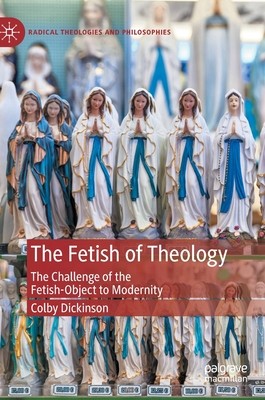
- We will send in 10–14 business days.
- Author: Colby Dickinson
- Publisher: Palgrave Macmillan
- ISBN-10: 3030407748
- ISBN-13: 9783030407742
- Format: 14.8 x 21 x 2.1 cm, kieti viršeliai
- Language: English
- SAVE -10% with code: EXTRA
Reviews
Description
By delving into the history of the fetish-object among both modern and contemporary commentators, this book highlights the fetish-object's role as a philosophical and religious concept of the highest significance. Historically, fetishes are implicated in specific struggles for sovereign (political) and/or religious (hierarchical) power, with their interwoven symbols defined as the primary location for transcendence in our world. This book defines the political consequences of fetish-objects within a western cultural, and primarily theological context through a comparative approach of various literatures on fetish-objects--anthropological to the psychological, Marxist to the theological. It reconceives of fetishes as a form of resistance to oppressive structures, something which motivated Christians themselves historically, and shaped our western understanding of the sacraments far more than has been acknowledged. Taking up this conversation likewise holds forth the possibility of reconceptualizing how fetish-objects and sacramental presences both speak profoundly to our late-modern selves.
EXTRA 10 % discount with code: EXTRA
The promotion ends in 23d.00:25:48
The discount code is valid when purchasing from 10 €. Discounts do not stack.
- Author: Colby Dickinson
- Publisher: Palgrave Macmillan
- ISBN-10: 3030407748
- ISBN-13: 9783030407742
- Format: 14.8 x 21 x 2.1 cm, kieti viršeliai
- Language: English English
By delving into the history of the fetish-object among both modern and contemporary commentators, this book highlights the fetish-object's role as a philosophical and religious concept of the highest significance. Historically, fetishes are implicated in specific struggles for sovereign (political) and/or religious (hierarchical) power, with their interwoven symbols defined as the primary location for transcendence in our world. This book defines the political consequences of fetish-objects within a western cultural, and primarily theological context through a comparative approach of various literatures on fetish-objects--anthropological to the psychological, Marxist to the theological. It reconceives of fetishes as a form of resistance to oppressive structures, something which motivated Christians themselves historically, and shaped our western understanding of the sacraments far more than has been acknowledged. Taking up this conversation likewise holds forth the possibility of reconceptualizing how fetish-objects and sacramental presences both speak profoundly to our late-modern selves.


Reviews